Reddit Lambasts An Entitled Dognapper Who Thinks He Already Owns The Dog Entrusted To Him By A Friend In Rehab
Dogs are family. Even if you'll be separated for a while because you need to get something done, your familial connection with your pet will never change.
Sometimes, pet owners find themselves in situations where they have no choice but to entrust their dogs to friends or family. They may go for months without seeing one another.
Then, the family entrusted with the dog becomes attached to it. But why is it so easy to get attached to a dog, even if it's not ours?
Well, there are actually a few scientific reasons behind this. For one thing, dogs are social creatures, and their brains are hardwired for companionship.
In fact, studies have shown that dogs release the same bonding hormone, oxytocin, as humans do when they interact with someone they love. So when we cuddle up with a dog, we're actually experiencing the same physical feeling of love and connection that we would with another human.
Additionally, dogs provide us with a sense of security and protection. They make us feel safe and loved, which can be especially helpful when we're feeling down or anxious.
But even with all these positive aspects, it's important to remember that the dog has an owner. Even if we've grown to love the dog as if it were our own, we should learn how to let go.
Unfortunately, some people refuse to return the dog because they've become too attached to it. This is very unfair to both the owner and the dog.
Today, we're going to look at a story of an entitled dognapper. He agreed to take care of his friend's dog for six months.
This friend is suffering from alcoholism and has taken a significant step by entering rehab. Six months have passed, and when it's finally time to return the dog, the man refuses, claiming that it is already his.
The Dognapper's Story
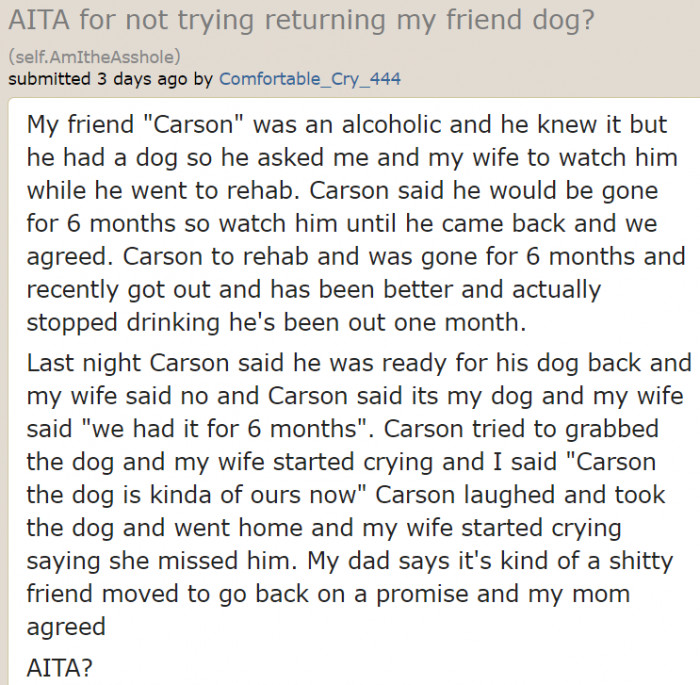
He's Not Doing His Part of the Deal.

This Person is Beyond Unreliable. We Have No Words.

Understanding Entitlement and Responsibility
Dr. Rachel Green, a behavioral psychologist, explains that entitlement issues often stem from underlying insecurities and unmet needs. When individuals prioritize their desires over others, it can lead to conflicts that reflect a lack of empathy and understanding.
Research shows that such behaviors may be reinforced by past experiences where individuals received unchallenged support, leading to a skewed perception of ownership and responsibility towards shared resources.
The Psychology Behind Entitlement and Ownership
The actions of individuals who feel entitled to others’ possessions often stem from deeper psychological issues related to control and insecurity. Research suggests that entitlement can be linked to narcissistic traits, where individuals may lack empathy for others' feelings. According to studies published in the Journal of Personality and Social Psychology, those with high entitlement often view themselves as deserving of special treatment, which can lead to exploitative behaviors.
This sense of superiority may cloud their judgment, leading them to disregard the rights of others in favor of their own desires.
So Many Dogs Out There Need Love, and Yet They Choose to Dognap.

How Dare They Do This to a Person Who Tried Hard to Become Sober!
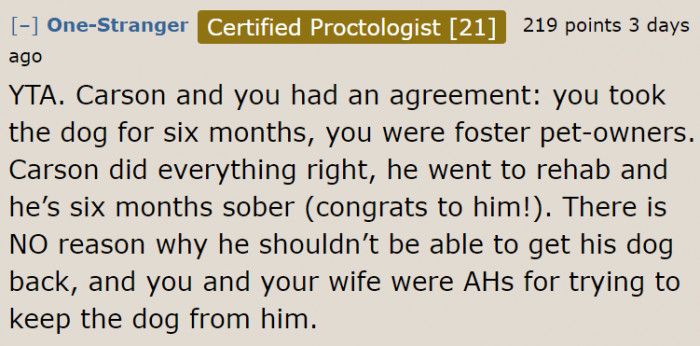
The Original Poster (OP) is the One Breaking the Agreement.

In situations involving shared pets, it's essential to establish clear boundaries and responsibilities to avoid entitlement conflicts. Behavioral experts suggest that mutual agreements about pet care can promote accountability and reduce feelings of ownership based on misunderstanding.
When everyone involved understands their roles, it can foster a more positive environment and minimize disputes.
Experts in social psychology note that entitlement can also be reinforced by societal norms that prioritize individualism over community well-being. This cultural context can create an environment where selfish behaviors are normalized, leading to the justification of actions like dognapping. Research indicates that social reinforcement of entitlement can diminish a person's ability to empathize with others, further perpetuating these harmful behaviors.
Addressing these issues requires a societal shift towards fostering empathy and community responsibility.
Despite the OP Being the Jerk, This Redditor Was Kind Enough to Direct Him to a Place Where He Can Find Dogs Who Need Their Love.

Why Do This to a Person Who Just Recovered?

The OP and His Wife Are the Worst Type of Friends.

The Impact of Past Experiences
Research in social psychology indicates that past experiences significantly shape current behaviors and attitudes. Individuals who have not been held accountable in past relationships may struggle to respect boundaries in present situations.
Understanding that entitlement often arises from a lack of awareness can help others navigate these conflicts with compassion rather than anger.
Consequences of Entitlement on Relationships
When entitlement manifests in relationships, it can lead to significant conflicts and breakdowns in trust. Dr. Alexandra Solomon, a relationship therapist, states, "Entitlement can create a significant barrier to connection, as it often stems from a lack of empathy and understanding." Healthy relationships rely on mutual respect and shared values, as highlighted on her professional website, Dr. Alexandra Solomon. When one party feels entitled to take from another, it undermines the foundation of trust, which is essential for any successful partnership.
They'll Never Win the Case.
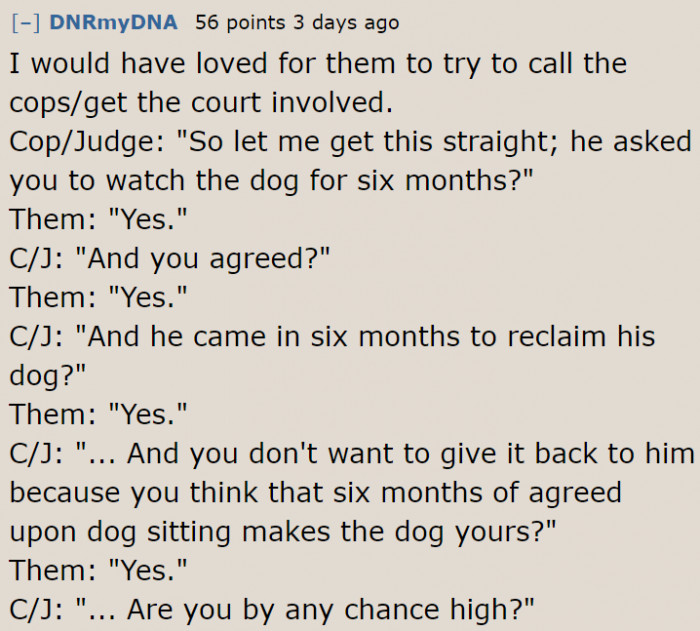
Did He Not Realize That He Technically Stole the Dog with That Move?

In the First Place, He Agreed to Take Care of It for Six Months.

According to Dr. Alexandra Solomon, a relationship therapist, "Empathy is the cornerstone of healthy relationships; when we can step into another's shoes, we foster understanding and connection." Additionally, Dr. Brené Brown, a renowned vulnerability researcher, emphasizes that "accountability is a key component in overcoming entitlement; it encourages individuals to recognize their impact on others." These insights suggest that cultivating empathy and personal responsibility can significantly reduce entitlement behaviors in interpersonal dynamics.
To mitigate the impacts of entitlement in relationships, fostering a culture of accountability is crucial. Encouraging open discussions about feelings and expectations can help individuals understand the consequences of their actions. Research supports that creating environments where individuals feel safe to express their concerns can promote empathy and understanding, ultimately leading to healthier interactions.
Establishing clear boundaries and expectations can also reduce the likelihood of entitlement behaviors in relationships, fostering healthier dynamics.
The Owner Kept His Word. He Should Be Keeping His.

Just Adopt a Dog Already!

They Always Have the Option to Adopt.

Since He Didn't Keep His Word, He'll Lose a Friend.
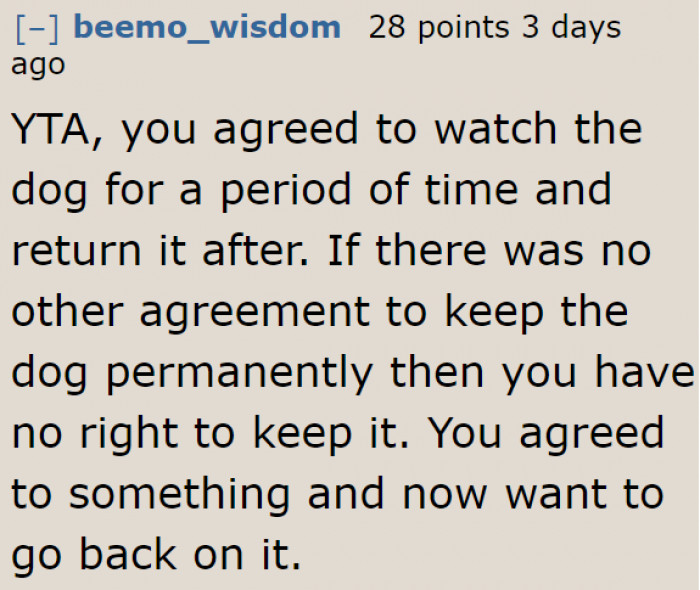
What He Did Was Stealing.

He Didn't Have to Ask the AITA Community. He Only Needed to Use His Common Sense.
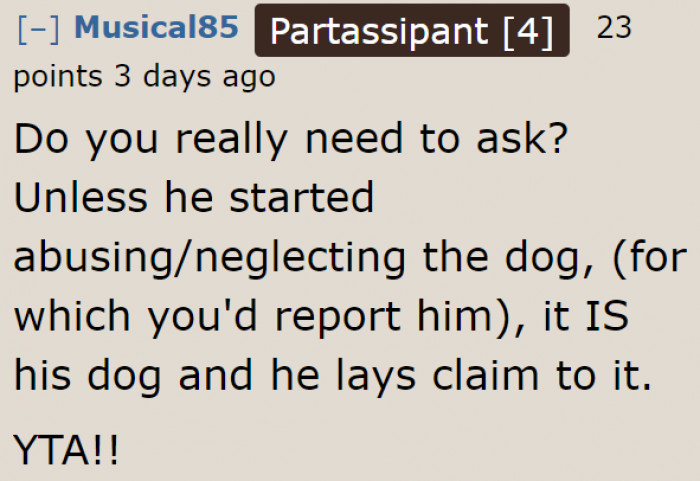
Getting a Puppy is the Right Thing to Do.

It Will Never Be His Dog.

He Just Lost That 'Friend.'
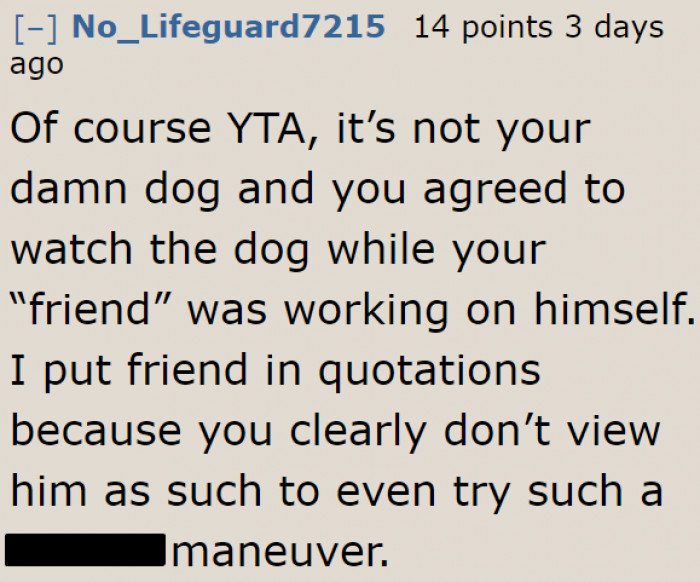
It's Crystal Clear Who's in the Wrong Here.
There was an agreement made, and the OP's friend did his part. If he had returned the dog without issue and adopted a puppy, we're pretty sure everyone would be happy.
There are so many dogs who need love from humans. We hope they do the right thing by adopting one in the future.
Psychological Analysis
This situation exemplifies the complexities of entitlement within relationships and how it can lead to significant interpersonal challenges. It's crucial to address these issues through open dialogue and accountability, enabling individuals to recognize the impact of their actions on others. By fostering a culture of empathy and respect, relationships can be strengthened and conflicts minimized.
Analysis generated by AI
Analysis & Alternative Approaches
Understanding the psychological underpinnings of entitlement can help in addressing harmful behaviors and improving relationships. According to research, fostering empathy and accountability in social interactions can mitigate the negative effects of entitlement.
By prioritizing communication and establishing boundaries, individuals can work towards healthier, more respectful relationships.
Analysis & Alternative Approaches
Ultimately, addressing entitlement issues requires empathy, clear communication, and a commitment to shared responsibilities. As highlighted by psychological research, understanding the motivations behind such behaviors can help individuals navigate conflicts more effectively. By fostering accountability, relationships can thrive amidst challenges.



